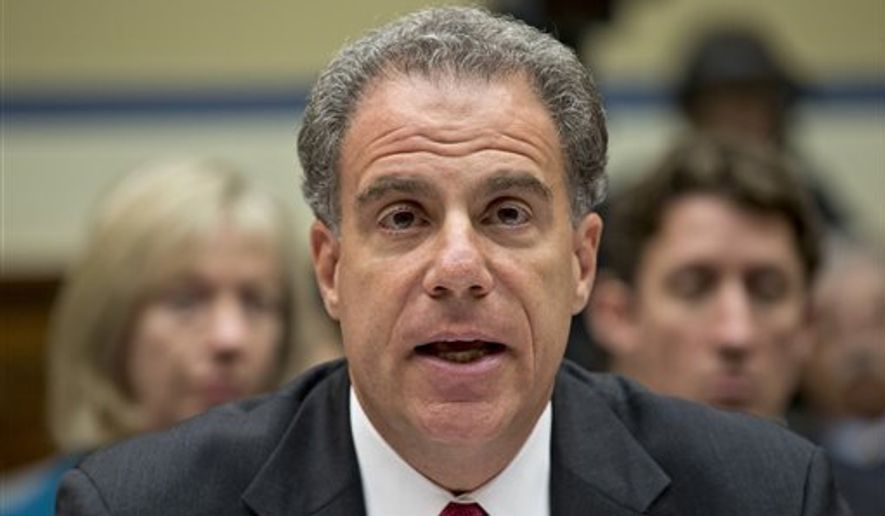The Justice Department’s inspector general said Wednesday that he is investigating whether the FBI overstepped its bounds when it conducted secret surveillance of a Trump campaign figure in 2016 and 2017, and whether the FBI bungled its handling of the anti-Trump “Steele dossier.”
Republicans last week revealed that the dossier played a significant role in getting the secretive Foreign Intelligence Surveillance Act court to approve wiretaps of Carter Page, a foreign policy adviser to the Trump campaign.
Inspector General Michael E. Horowitz did not identify Mr. Page nor Christopher Steele, the former British spy who was paid by Democrats to assemble the salacious and unverified dossier on Donald Trump. But Mr. Horowitz left little doubt that is what he will be investigating.
“In response to requests from the Attorney General and Members of Congress, the Office of the Inspector General (OIG) will initiate a review that will examine the Justice Department’s and the Federal Bureau of Investigation’s (FBI) compliance with legal requirements, and with applicable DOJ and FBI policies and procedures, in applications filed with the U.S. Foreign Intelligence Surveillance Court (FISC) relating to a certain U.S. person,” Mr. Horowitz said in a statement.
Republicans, who for months had suspicions about the FBI’s handling of the situation, said it was about time an investigation began.
But they said the inspector general’s probe doesn’t obviate the need for a special counsel as well because Mr. Horowitz is limited by law and won’t be able to fully investigate people who are no longer in government service.
That could put former FBI Director James B. Comey, former Deputy Director Andrew McCabe and former Deputy Attorney General Sally Q. Yates — each of whom signed off on the surveillance request at some point — beyond the reach of the investigation.
“I still believe we need a second special counsel to ensure the investigation is thorough and complete,” said Sen. Lindsey Graham, a South Carolina Republican who has been tracking the issue. “The American people are rightfully troubled by the information they have heard about politicization in DOJ.”
Rep. Jerrold Nadler of New York, the ranking Democrat on the House Judiciary Committee, called the investigation “a shame” and said Mr. Horowitz is being forced to chase a conspiracy theory.
“Any objective review of these claims should tell us what we already know — that the FBI was right, that there was sufficient evidence to continue investigating certain Trump campaign officials for their connections to the Russian government, and that the Republicans are desperate to distract from that investigation,” Mr. Nadler said.
The Justice Department declined to comment on Mr. Horowitz’s announcement.
The Steele dossier was compiled by Mr. Steele on orders from the Democratic National Committee and the Clinton campaign. It accused the Trump campaign of colluding with Russia during the 2016 election campaign and, for good measure, included graphic details about frolicking with prostitutes in a Moscow hotel.
Mr. Trump and his team have denied the claims, and most of the dossier remains unsubstantiated. Mr. Steele himself has cast doubt on some of his own findings in a court case playing out in London.
The FBI used the Steele dossier to help persuade the FISA court to approve wiretapping Mr. Page. Mr. Horowitz will investigate how instrumental the dossier was and whether the FBI should have been more suspicious of its information or more forthcoming with the court about the political antecedents.
Republicans say the FBI shielded key details from the court and that no surveillance would have been approved if the bureau had been honest. Democrats counter that the FBI gave the court enough information and argue that the surveillance would have been approved even without the Steele dossier. They also point out that the surveillance of Mr. Page didn’t begin until after he had separated from the Trump campaign.
Mr. Steele was dumped as an FBI source after the bureau discovered he was leaking to the press, Republicans say.
Mr. Graham and Sen. Chuck Grassley, Iowa Republican, have also asked the Justice Department to pursue a criminal case against Mr. Steele. They say his admissions in the London court case show he lied to the FBI.
Mr. Steele’s supporters describe his information as raw intelligence and say it shouldn’t be surprising if much of it is wrong.
But some of what Mr. Steele reported — contacts between former Trump campaign chief Paul Manafort and Russian operatives — appears to have been substantiated.
In a court filing late Tuesday, special counsel Robert Mueller, tasked with investigating accusations of collusion, said Manafort aide Rick Gates did knowingly meet a person with ties to Russian intelligence.
The documents say Mr. Gates and the unidentified individual were in touch in September and October 2016, just before the election. The contacts are “pertinent to the investigation,” prosecutors said in a court filing.
Mr. Gates has pleaded guilty to conspiracy and lying to the FBI. Mr. Manafort has maintained his own innocence.
In addition to Mr. Mueller’s probe of the Trump campaign and the inspector general’s investigation of the FBI, House Republicans are examining whether the FBI bungled its look into former Secretary of State Hillary Clinton’s secret email account.
Republicans say revelations about Mr. McCabe, Mr. Comey and other FBI personnel assigned to the Clinton investigation suggest irregularities.
The FBI is cooperating with the House Republican investigation, and Director Christopher A. Wray said late Tuesday that he is doubling the number of employees working to turn over documents and making them work in two shifts a day, from 8 a.m. to midnight, to review and release material.
“I agree the current pace of production is too slow,” Mr. Wray said in a letter to Rep. Bob Goodlatte of Virginia and Rep. Trey Gowdy of South Carolina, the Republican committee chairmen who are leading the House investigation.
• Stephen Dinan can be reached at sdinan@washingtontimes.com.
• Jeff Mordock can be reached at jmordock@washingtontimes.com.




Please read our comment policy before commenting.